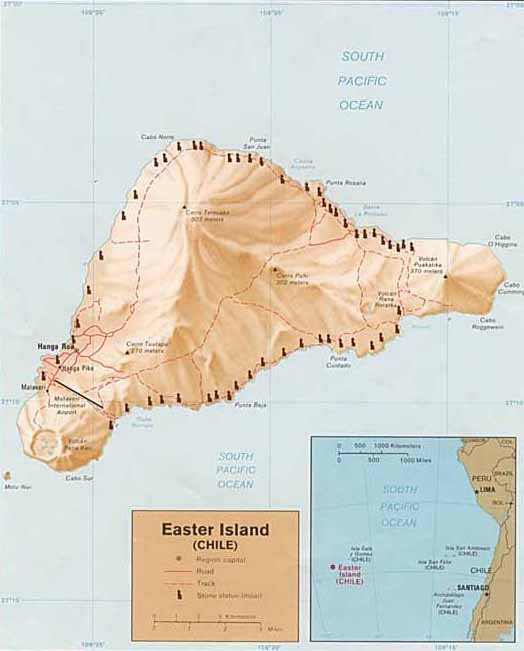Easter Island's name is derived from the date that it is first discovered by Europeans. On Easter Day 1722 the Dutch admiral Roggeveen landed on this island to explore. What he found was a desolate steep island with no trees except for a few bushes, a small population (approx. 100) of very primitive cannibalistic people, and numberous huge statues of big faces, called moai.
It was clear that these people weren't capable of building, let alone placing these statues on themselves, so they asked the people how they got there. The answer: they came walking on the island.
Roggeveen left the island without leaving the Dutch flag there. It wasn't worth it.
So...how did these statues get there? And how did those people get there? Just recently scientists figured it out after examining the entire island, especially garbage dumps.
The history
In the 5th century AD the Polynesians were busy populating all the islands in the pacific. One ship - they were great navigators in their time - landed on Easter Island, estimated with 20-30 people on board, and some vegetables and animals. What
they found was an island completely covered by a thick tropical forest. After settlement they started to try out their vegetables, but nothing was really able to grow there, except sweet potatoes. Also only the chickens survived. And with wood, amply available, they made canoes for fishing.
The advantage of sweet potatoes is that they don't take much time to take care for. That gave them much spare time and the ability to develop a culture.
The population grew and clans were formed. One clan consisted of a handful of families (including grandparents, nephews, etc). It was a prestige for these clans clans to make these statues, moai, which was a form of cultural expression. They chopped them in the caves, and then moved them to the shore by chopping and knocking down trees and rolling them over the trunks.
At the peak of the society they population consisted of approximately 7000 people. But the rivalry grew. The clans made more and more effort to place more moai. And that of course costed a lot of wood. The crude fact is that once wood started to run out, it only became
even more a prestige to place one moai more, so there was a big run for the last trees on the island until suddenly there wasn't a single tree left. Then the misery came.
With no trees the harvests of the sweet potatoes failed because of erosion by the rain. The also were not able to build more fishery boats and so the only thing left were the chickens. Famine stroke the island and the chickens became highly valuable. At present one can still find cages of stone on the island because they started to steel each others chickens, and when they figured out that wasn't enough, they enslaved members of other clans and eat them up.
As said in the beginning: then the Europeans came and what they found were only about a 100 people,
ignorant of their own history! After all, they didn't know where the moai came from. A civilization lost.
Bottomline conclusion
This is a perfect example of mismanagement. And they weren't the only one: Babylon also went to rack and ruins because of depletion of resources. The Aral lake is currently about half it's original size. And mismanagements of soils in Africa are making the food shortage even bigger.
And now there is globalization: the entire world in interaction, and not a single other planet available to flee to. We're slurping oil and pumping up greenhouse gasses. Only some countries are able to do something about this, but whenever possible they try to let others cut down in environmental-destructive production so that they can continue a bit longer. Will we defeat egoism and save the planet together?



 And indeed: as long as they don't do that, Europe will only cut themselves in the finger by do administrating rights of emission, and having to pay for it. If I were a Dutch heavy metal industry, I'd know what country to go to.
And indeed: as long as they don't do that, Europe will only cut themselves in the finger by do administrating rights of emission, and having to pay for it. If I were a Dutch heavy metal industry, I'd know what country to go to. 


 ).
).

